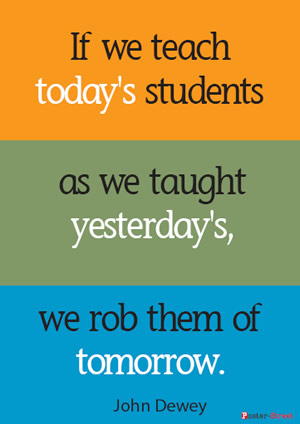Probably not....but guess what...some of your students do! I'm going to take you back a few years (almost a decade) to when I taught in a small town in rural Alberta. This town, I might argue, skewed the statistics on Socioeconomic Status and value in Education (snapshot on some of the research). Most of my students had a parent or parent(s) who worked in the oilfield and, since it was in the prime of boom time in Alberta, they were making great money. A lot of those same parents did not have any post secondary education and some didn't even have a high school diploma. It was this perfect storm that caused some of my students, in Grade 6, to say "I don't need school, I'm just going to work in the oilfield". Unfortunately, they weren't able to see a couple of things. First, working in the oilfield is hard work! So, if you want to keep a job long enough to make good money, you had to be prepared to work hard. Second, what happens when the boom busts? I get that trying to get an 11 year old to see the "big picture" is tough and I struggled to connect with these students to make the classroom content relevant to them. Mostly because I have never worked on a rig and I have no idea what I was teaching could have or would have connected to the rigs, aside from work ethic. I think hard work is one of the most important "soft skills" to be taught in school, but it's not an easy task.
Fast forward to today... I have a student who (and this student is not the only one) who LOVES vloggers! I don't know exactly how much time a day this particular student spends watching YouTube vloggers but guessing from how bleary eyed he is when he gets to class....I'm going to assume a few hours a day. Today, we were working on multiplying decimals by whole numbers in Math class and this particular student was having an off day. I got the chance to go for a walk with him and found out that he believes, he doesn't need to learn about multiplying because he's going to be a YouTube star. He also explained how school was boring for him because he just wants to be YouTube star and nothing he learns in school will help him with this. Sound familiar?! Yep, YouTube vlogging became the oilfield of today's classroom! I know a little bit more about YouTube and Vloggers, so I latched on to this one.
I asked him, "Does he think being a vlogger is easy?"
His response, "yeah, they just record themselves doing stupid stuff...I can do that".
In my attempt to explain to him the amount of work that vloggers put into a "simple" 5 minute video is insane, I had a light bulb moment. I wanted to make the learning in the classroom relevant to him and also to have him think about his future. Not once did I tell him he wasn't or couldn't be a YouTube star...in fact...I encouraged it (just not during Math right?! 😉). I decided he was going to start planning this out. I had about 10 minutes before recess was out, so I quickly sent a couple of messages to his YouTube heroes in hopes a miracle reply of them explaining the amount of work it takes to produce a single video (no luck in replies yet). I also put together a quick (extremely ugly and not toooo well planned out) sheet of guiding questions for research and the beginnings of creating a budget (check it out here...if anyone wants to make changes, aesthetic improvements, etc. feel free). Through some discussions I was able to point out that a lot of the math calculations we were going to be learning about this year. We also talked about how to calculate percentages and that Jake Paul's information and YouTube's ad revenue information didn't match up, I couldn't quite tell him that maaaaaaybe Jake Paul's math wasn't the most accurate. The student however, was hooked, he spent a good chunk of the day planning, researching (both LA outcomes) and doing some Math (even multiplying decimals) to figure out his start up costs, monthly operating costs and how many viewers and views he was going to need to make some money. This was the most engaged I saw this student this school year. Unfortunately, in the world of school, the bell went and he had to head off to another class and since I don't teach him the rest of the day, we weren't able to reconnect to see what he had done. We haven't figured out how many viewers, views, advertisers or sponsors he's going to need in order to make the millions he dreams of, but perhaps some day.
When I was working with this student, I was thinking how much I want to make my classroom personal and relevant to as many students as possible. I also came to an understanding that, although this is the ideal for me, reality may not allow it. Time, curriculum, provincial achievement tests, team teachers, student needs, may not allow for me to make this happen.....this time around.




